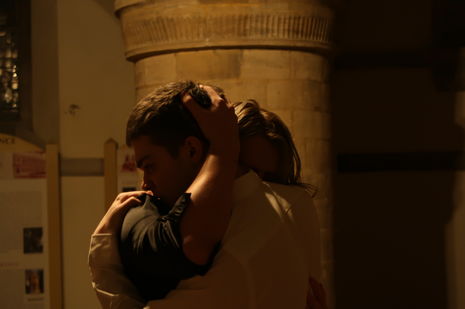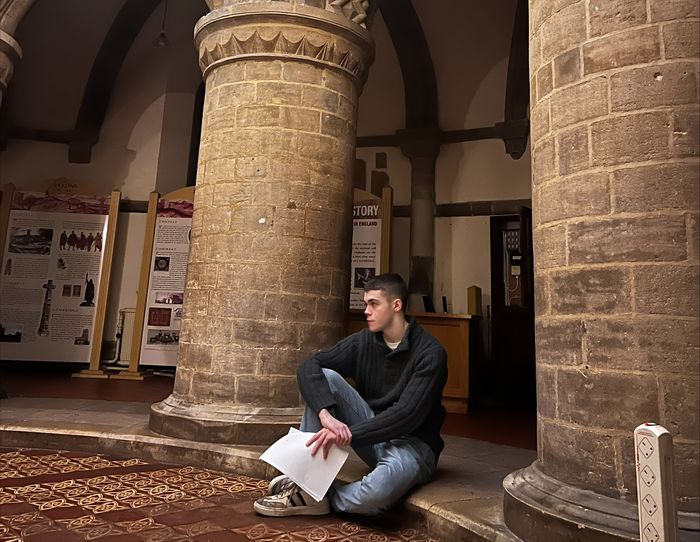‘GCSE English, eat your heart out’: Macbeth in the Round Church is bloody fun
Molly Scales praises innovation and intelligence in Evie Chandler’s production (but asks that we up the volume)

I miss high school English. I miss a classroom of kids being forced to learn Lear, read Rosaline, make a habit of Hamlet. There’s something wonderful about the desperate concentration of twenty-five kids, pouring over words written more than four hundred years ago, trying to pick out something, anything, they can use in an essay. We can all still turn to Shakespeare, but that collective childhood experience is over for me.
Or so I thought. That was, until I saw Evie Chandler’s Macbeth at Cambridge’s Round Church. Played entirely in the round (surprise surprise!), with no set dressing beyond the stonework faces that leer over the temporary stage, this is an assured production. But it was small quirks of voice work, tricksy decisions about movement, and some particularly inspired bits of direction that had me feeling like a child in a National 5 (Year 11 for the non-Scots) English classroom all over again: I felt like I was learning. Chandler’s production made the audience strain for every word, and crane their necks to catch every detail of performance, with a strange, frantic energy that made me examine the Scottish play anew.
There’s Macduff, for instance. With a decisive “that way the noise is. Tyrant, show thy face!”, Macduff (Theo Parkin) made the evening’s only intrusion into the audience’s space. He stalked a circle around the church, behind the audience’s seats. I had to stop myself bouncing in my seat for fear of putting Parkin off. This decision is rife with potential. Is Chandler aligning Macbeth’s eventual slayer with the audience watching his tragedy unfold? The play doesn’t tell us, but it is such brilliant uses which had me skipping home and lunging for my Macbeth faster than you can say “multitudinous seas incarnadine.”
The play’s innovation doesn’t stop there. The witches do not speak in simultaneous chants. Instead, their voices babble over one another, three interweaving strands of a half-remembered dream – and handily dodging cliche in the process. Talking of dodging cliche… There is not a Scottish accent to be found here. I think this might have been a good call, not least because as a Glaswegian, I would have let them have it had the accents been less-than-stellar. However, hearing the words “Hail, King of Scotland!” in perfect RP was on the jarring side. Och, well.
"Macbeth is iconic. But so much attention is directed at Macbeth and Lady Macbeth as individuals that this production still feels beautifully new.”
Movement coordinator Olivia Krauze deserves praise for the Sisters’ fluid, brook-like steps upon the stage, mimicking their innovative vocal work in their physicality, and providing a welcome contrast to the stiff-backed court scenes. The most important innovation of the play, its staging in the round, however, was the only feature I really struggled with. Chandler and her team have done a sterling job with the play’s blocking, while the venue, dressed by Kit Mulherin, is atmospheric to the bloodied hilt. Yet I found myself losing a great deal of dialogue, as well as a hefty bit of the action. Shakespeare’s tricky at the best of times – so please, give me a chance! Let me get at it! I think, on the whole, it’s worth these inconveniences for the sheer gothic oomph of the setting. Still… When Macbeth said “look to my Lady,” I wanted to scream “I’m trying!”
Macbeth is iconic. But so much attention is directed at Macbeth and Lady Macbeth as individuals that this production still feels beautifully new. Finn Cullen’s Macbeth and Jake Turner’s Lady Macbeth are solid individually. Turner in particular uproots Shakespeare; her Lady Macbeth is never malevolent or malicious, not from where I was sitting. That being said, I didn’t feel anything was lacking. I saw a Lady Macbeth I hadn’t seen before, and she was magnetic. When she excuses Macbeth’s vision of Banquo at the feast with a quick “My lord is often thus/And hath been from his youth”, I believed her. I would’ve been dead as Duncan. I bought that Lady Macbeth knows all Macbeth’s childhood terrors; their intimacy sold me completely. The Macbeths shine as a pair. It got to the point where I was willing their soliloquies to be over, purely because I needed to see the two of them together. There’s more forehead-pressing than you can shake a bit of Birnam Wood at. It could feel repetitious, but you can’t help but be transfixed. This repetition might even be deliberate: I had already seen the image of Lady Macbeth’s hands, tangled in Macbeth’s hair to pull him closer a few times, so when the same image was repeated with bloody hands “of your colour”, I gasped.
“Chandler and her team have created a Macbeth I can wholeheartedly get on board with. It’s new; it’s delicious; it features mesmerising fruit-eating.”
It feels strange to single out one performance amongst a cast so robust. It feels stranger still to further single out one aspect of a performance. And yet… There is something about Cullen’s vocal work as Macbeth which deserves, not only praise, but sponsorship from the RSC, a place alongside some of the great Shakespearian voices of our age, and quite possibly, a Shakespeare ASMR channel. Had Chandler picked a different Shakespeare, I would have said listening to Cullen felt like having my head dunked in a vat of red wine: it’s intoxicating, bloody, and leaves you with something rare and valuable dripping out your ears. Where I often found myself straining to hear other actors, losing lines I fear are essential in a play as wonderfully violent in its dialogue as Macbeth, I relaxed every time Cullen stepped on stage. Whether he’s hollering battle cries, gibbering in fear, murmuring love in his lady’s ear, Cullen is word-perfect, mesmerising, and honestly? Fun. There was something of Laurence Olivier’s Richard III in his early composure, there was something of Jim Carey in his physicality during Macbeth’s descent into madness, and there was something of The Shining in his intonation of “thou losest labor” (I won’t be surprised if I have nightmares).
Chandler and her team have created a Macbeth I can wholeheartedly get on board with. It’s new; it’s delicious; it features mesmerising fruit-eating. Watching it, I was reminded of Michael Allan’s words in the preview for this production: “that sounds like a dangerous Macbeth to me.” I’m not sure if this adaptation was vicious enough to be dangerous in the traditional sense. But there’s a danger in its radical readings of Shakespeare. The way Chandler, Cullen, Turner, and company are cutting into the bard’s lines, carving out their own space between them, and creating something entirely new in the process… That’s my kind of danger. It’s close-reading with swords drawn. GCSE English, eat your heart out.
Macbeth is playing Friday 15th to Sunday 17th March 2024 at The Round Church
 Comment / Are degrees still worth it?4 August 2025
Comment / Are degrees still worth it?4 August 2025 News / Cambridge Folk Festival to relaunch in 20265 August 2025
News / Cambridge Folk Festival to relaunch in 20265 August 2025 Sport / ‘A full-time job with overtime’: should disparities change the way we approach Bumps?6 August 2025
Sport / ‘A full-time job with overtime’: should disparities change the way we approach Bumps?6 August 2025 News / Two arrested after death of Cambridge language school student 4 August 2025
News / Two arrested after death of Cambridge language school student 4 August 2025 Features / Selling the Cambridge experience: private summer programmes in the historic university 3 August 2025
Features / Selling the Cambridge experience: private summer programmes in the historic university 3 August 2025










